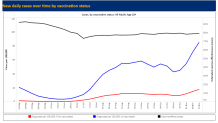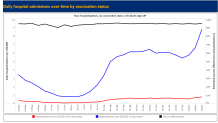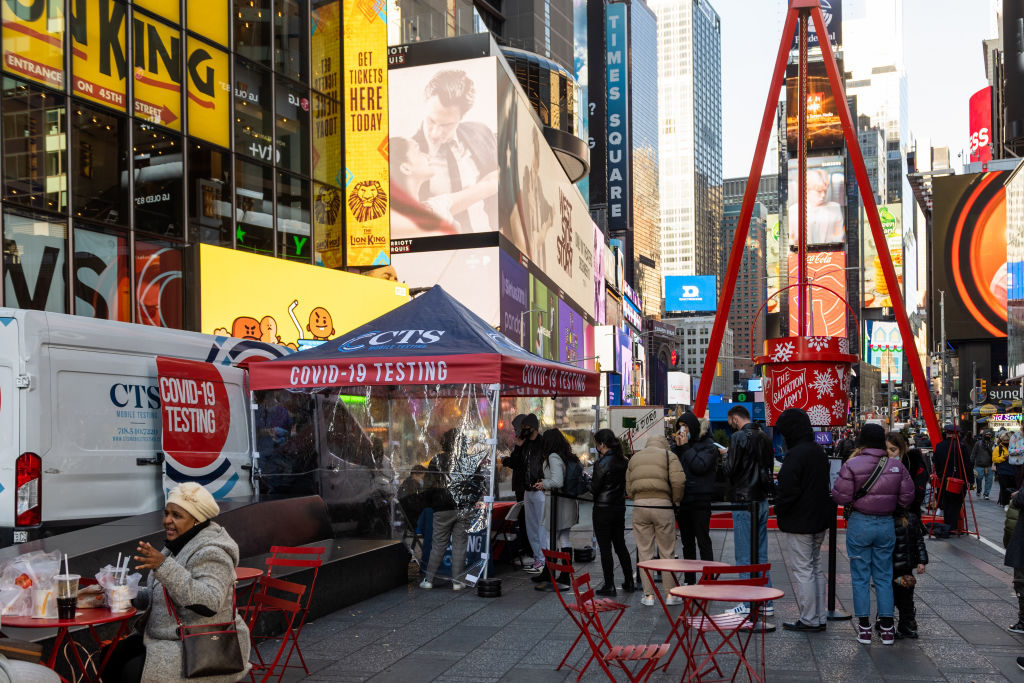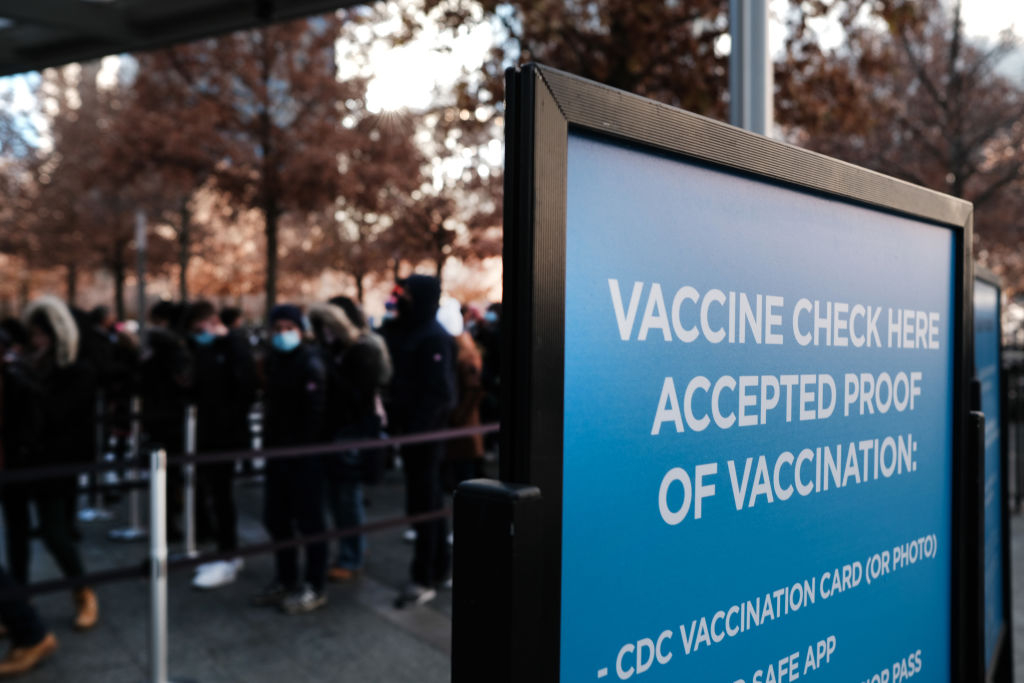What to Know
- Gov. Kathy Hochul says stricter measures are needed to curb COVID spread across the state; delta has driven hospitalizations to months-long highs while omicron may be fueling the latest case surge
- Daily COVID deaths in NY topped 50 (54) on Thursday for the first time in months, while the daily caseload topped 12,400 for the first time since late January -- and hospitalizations are up 86% in the last month
- Omicron has now been identified in at least half of U.S. states and 60-plus countries, NY's health chief says; early data on severity has been encouraging but delta continues to drive up the hospitalization rate
Come Monday, all indoor public places in New York that do not require proof of full vaccination for entry must implement a mask mandate, Gov. Kathy Hochul announced Friday. She called it a "major action" to address the worst COVID surge the state has seen in more than half a year across all of the key indicators.
The decision was based on mounting concern of the state's weekly seven-day case rate and rising hospitalizations, Hochul said. Noncompliance comes with fines of up to $1,000 per violation. The order will be reassessed on Jan. 15. It covers any indoor space that is not a private residence. Here are three key things businesses, employees and the public should know about it right now.
The statewide seven-day average case rate has increased by 43% since Thanksgiving and hospitalizations are up 29% in that timeframe, the governor said. Vaccinations have increased 2% in that window, not enough to outpace the spread.
In total, COVID-19 hospitalizations statewide are at their highest levels since late April and have soared 86% in the last month alone, the latest data shows. Hochul and health experts say that's a reflection of the still omnipresent grip of delta, which accounts for 99% of all genetically sequenced positive samples in New York -- and the nation -- and has been scientifically linked to more severe cases of infection.
Those across-the-board upticks combined with the looming threat of holiday-related spikes warrant intense, early action, Hochul said. Local health departments are being asked to enforce the new requirements.
Get Tri-state area news delivered to your inbox. Sign up for NBC New York's News Headlines newsletter.
"The temporary measures I am taking today will help accomplish this through the holiday season," the Democrat said. "We shouldn't have reached the point where we are confronted with a winter surge, especially with the vaccine at our disposal, and I share many New Yorkers' frustration that we are not past this pandemic yet."
Read the full text of the new state mask mandate right here.
Daily COVID deaths in the state topped 50 (54) on Thursday for the first time in months, while the daily caseload topped 12,400 for the first time since late January. The latter increase could be reflective of omicron's spread throughout the state. Hochul and New York City leaders have said community transmission appears to be well underway. While just 20 cases statewide have been detected so far (13 of them in New York City), officials believe the actual number is significantly higher.
Hochul's announcement comes a day after she said nearly three dozen upstate hospitals had to suspend non-essential elective procedures to secure bed capacity, part of what she described as a preemptive strike to "fight this impending surge."
The previously announced order to suspend elective surgeries is designed to ease capacity strains on hospitals as COVID-19 cases surge. It only applies to hospitals that have less than 10% bed capacity available, many of which are in areas where Hochul says lower vaccination rates correlate with the higher, concerning metrics.
Hochul said the state will reassess the surgery pauses on Jan. 15, the same date she'll review the new mandate, because she doesn't want to order long-term protocol changes without giving people an idea of how long they may be needed.
The mid-January review allows time for the holidays to pass and any potential spikes related to travel or gatherings to materialize. It also provides more protection for people when they're more likely to be indoors, at the coldest time of the year.
"I have warned for weeks that additional steps could be necessary, and now we are at that point based upon three metrics: Increasing cases, reduced hospital capacity, and insufficient vaccination rates in certain areas," Hochul said Friday.
Even in cases where vaccination rates are higher, COVID's recent spread, whether omicron-induced or otherwise, is far outpacing them. While more data is needed to determine whether omicron is linked to more severe outcomes or reduced vaccine efficacy, experts say it certainly appears to be more infectious than earlier strains, possibly even more infectious than delta.
The CDC said this week that of the 40-plus U.S. people who have been found to be infected with omicron so far, more than 75% of them were vaccinated. Breakthrough infections have been rising in New York since early November, though still account for a fraction of new infections compared with the non-vaccinated.

There has been an uptick in hospitalizations among vaccinated New Yorkers but it's meager -- and the discrepancy between hospitalizations among non-vaccinated and vaccinated New Yorkers is far more significant than the infection one.
Importantly, the vaccine efficacy rate in terms of new cases and hospitalizations has not changed since early November for those aged 50 and older. In fact, it's up slightly compared with October, an encouraging sign for the most vulnerable. For those aged 18 and 49, though, it's marginally down, the latest state data shows.

A number of local governments where omicron has been detected have intensified COVID efforts in the last week or so in an effort to curb the spread.
New York City's mayor outlined a strictest-in-the-nation vaccine mandate earlier this week that is set to take effect on Dec. 27, while new vaccine requirements for kids under 12 go into effect on Tuesday.
De Blasio expressed support for Hochul's imminent mandate in a tweet on Friday, calling her "absolutely right to push harder against COVID-19, especially as winter approaches and cases rise."
"We’re laser-focused on climbing the ladder on vaccinations through our Key to NYC program, incentives, public and now private-sector mandates," he added.
In Oneida County, where two omicron cases have been detected, officials will require masks to be worn in indoor public places and for temperature checks to be conducted at social gatherings taking place outside of private residences starting Monday. There will be an opt-out if proof of vaccine is required for entry.
More Coverage
“We expect these numbers to continue to rise, and at this point, we are prepared to say what we have is community spread,” Hochul said Thursday. “It is not coming from people who have traveled.”
Both she, de Blasio and health officials across the country have upped their urgency around vaccination and boosters in recent weeks. That message has only grown more urgent in the last few days at all levels of government.
Half of U.S. states and more than 60 countries have now detected omicron, New York's health commissioner, Dr. Mary T. Bassett, has said. She noted early evidence does show vaccines protect against severe COVID illness and death linked to the new variant but at a time of multi-faceted threats, strong precautions are needed.
"Community spread requires a community-minded solution, as the omicron variant emerges and the overwhelmingly dominant delta variant continues to circulate. We have the tools we need to protect against the virus - and now we must ensure we use them," Bassett said Friday.
"There are tools each individual can use, and there are actions we can take as government," the health commissioner added. "Getting vaccinated protects you, and wearing a mask is how we will better protect each other. Both vaccination and mask-wearing are needed to slow this COVID-19 winter surge."
The state Department of Health has produced nation-leading studies, published by the CDC and the New England Journal of Medicine, which demonstrate the COVID-19 vaccines' effectiveness - particularly in preventing severe disease.
More than 81% of New York's adult population is fully vaccinated, CDC data shows, though that number plunges when it comes to the youngest eligible for shots. Just 65% of kids aged 12 to 17 are fully vaccinated, while kids aged 5 to 11, who only become eligible in the last six weeks, have a 6% full vaccination rate.
In New York City, 37% of kids aged 5 to 17 are fully vaccinated, while 48% have had at least one dose. Eighty-two percent of adults in the city are fully inoculated.
A day ago, the CDC and FDA recommended Pfizer vaccine booster doses for children aged 16 and 17. Officials urge parents take advantage. Learn more here.



